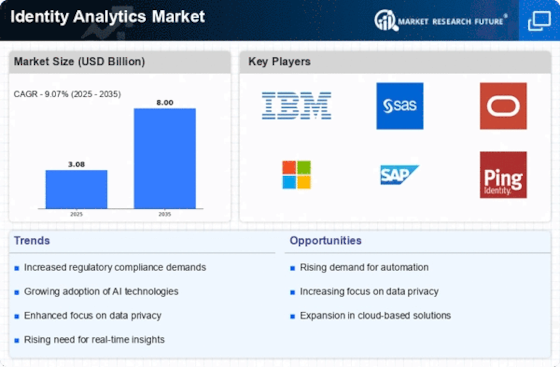Market Share
Identity Analytics Market Share Analysis
The Identity Analytics market is subject to a myriad of market factors that collectively shape its trajectory and growth. One crucial factor influencing this market is the increasing frequency and sophistication of cyber threats. As businesses and organizations strive to fortify their digital perimeters, the demand for robust identity analytics solutions intensifies. These tools play a pivotal role in detecting and preventing unauthorized access, ensuring that sensitive information remains secure.
Moreover, regulatory compliance exerts a significant influence on the Identity Analytics market. With the implementation of stringent data protection regulations globally, organizations are compelled to adopt identity analytics solutions to ensure compliance. These solutions assist in managing and monitoring user access, thereby aiding companies in adhering to complex regulatory frameworks and avoiding penalties associated with data breaches.
The growing complexity of IT infrastructures also contributes to the expansion of the Identity Analytics market. As businesses embrace cloud computing, mobile devices, and diverse applications, the need for effective identity and access management becomes paramount. Identity analytics provides a comprehensive approach to managing user identities across these diverse environments, streamlining access controls and mitigating security risks.
Furthermore, the escalating adoption of artificial intelligence (AI) and machine learning (ML) technologies is a noteworthy market factor. Identity analytics leverages these technologies to enhance its capabilities, enabling more accurate and adaptive threat detection. AI and ML empower identity analytics solutions to analyze vast datasets, recognize patterns, and identify anomalies in real-time, bolstering organizations' ability to respond swiftly to potential security threats.
The economic landscape also shapes the Identity Analytics market. As businesses seek to optimize their operations and reduce costs, the efficiency offered by identity analytics solutions becomes increasingly attractive. These tools not only enhance security but also streamline identity management processes, contributing to operational efficiency and cost-effectiveness.
The market is also influenced by the growing awareness among businesses regarding the importance of identity and access management. Recognizing the critical role that user identities play in safeguarding sensitive information, organizations are proactively investing in identity analytics solutions to strengthen their cybersecurity posture. This heightened awareness is driving the market's expansion as businesses prioritize comprehensive identity management strategies.
Moreover, the increasing prevalence of remote work is a market factor that cannot be overlooked. The shift towards remote and hybrid work models necessitates robust identity analytics solutions to manage and secure user identities outside the traditional corporate network. As the boundary between internal and external users blurs, identity analytics becomes instrumental in ensuring secure access from various locations and devices.
In conclusion, the Identity Analytics market is influenced by a dynamic interplay of factors that collectively shape its trajectory. From the evolving threat landscape to regulatory requirements, technological advancements, economic considerations, and changing work models, these market factors underscore the critical role identity analytics plays in modern cybersecurity and access management. As organizations continue to prioritize digital security, the demand for sophisticated identity analytics solutions is expected to persist and evolve in tandem with the dynamic nature of the cybersecurity landscape.


















Leave a Comment